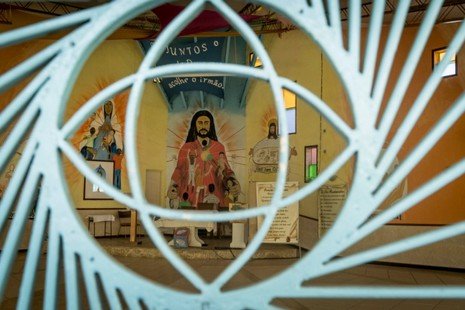The Latin American Catholic Church still maintains its hold on society

The Chapel of la Casa do Menor in Brazil. The banner reads "The love of God welcomes a brother".
/ Vincent Rosenblatt for La Croix
Jean-Pierre Bastian, professor of sociology of religion at the Faculty of Protestant Theology at Strasbourg, believes religious changes in Latin America and the breakthrough of the Evangelicals do not necessarily imply a decline of Catholicism on the continent. He spoke to La Croix.
Is Latin America in the process of becoming Evangelical?
Jean-Pierre Bastian: Evangelicals, particularly Pentecostals have made great progress in this part of the world over the last two decades.
As a percentage of the population, they have risen from 10% at the end of the 1990s to more than 15% in 2010, including peaks of nearly 30% in Brazil and Guatemala.
In essence, these Churches have thrived on poverty and social marginalization. So there is no reason that they will stagnate anytime soon.
At this rate, Pentecostalists, who are extremely fragmented, will undoubtedly be a majority by the end of this century.
Nevertheless, Latin American society is not in the process of abandoning the Catholic Church. The Catholic Church remains its most structuring element.
All the same, the Pentecostalists have some powerful positions, particularly in Brazil…
J-P B: Following the end of the Cold War, the democratic transition and the opening up of the world economy, these movements took off.
Initially, they took in the media including television and radio. In Brazil, the Universal Church of the Kingdom of God (EURD) owns the TV Record, one of the largest networks in the country with audiences that are nearly as high as those of TV Globo.
Popular religious practices including healing, exorcisms, etc. have also helped ensure that Pentecostalists have a large audience and are creating pressure on Catholics to follow in their footsteps.
Finally, their political influence has grown continually with the appearance of confessional Evangelical parties in all these countries.
What levers does the Catholic Church possess to deal with these developments?
J-P B: The 1980s and the 1990s witnessed the appearance of charismatic priests such as Fr Marcelo Rossi in Brazil who sought to imitate the Pentecostalist pastors.
Catholic television channels multiplied, the liturgy was pentecostalized… But the result was not very convincing.
As they became accustomed to moving between universes that were actually becoming more similar, people ultimately chose to go wherever the miracle was more impressive.
And the Pentecostalists will always be the winners in this field because the Catholic bishops have always warned against charismatic excesses among the faithful.
Thus the Catholic strategy of assimilating the religious practices of their rivals has turned out to be a double-edged sword.
Yet, you have not concluded that there will be a decline in Catholicism on the continent…
J-P B: As long as the Church manages to maintain its hold on society from above, it will not have much to be concerned about.
The Latin American economic and social elites are still Catholic and are mostly educated in pontifical universities. Catholicism remains the religion of nation-states throughout the region.
The Church still has the intellectual, theological and cultural resources to continue to orient society.
The issue for the Church is how it will be able to manage this historical legacy while remaining attentive to the humblest, who have already started to turn their backs on it.


 Votes : 0
Votes : 0









